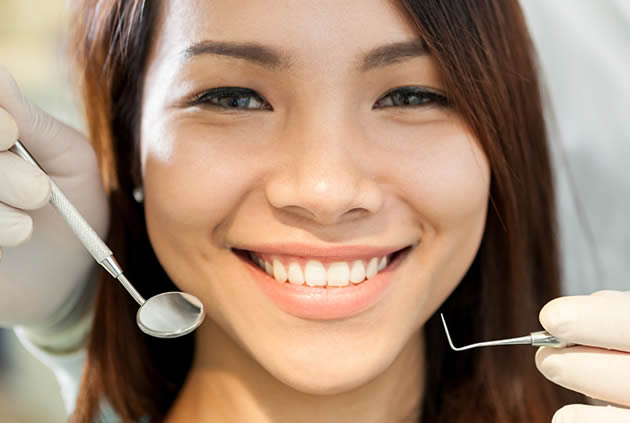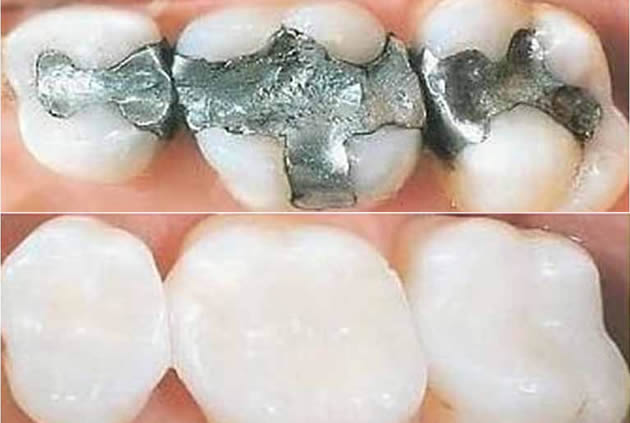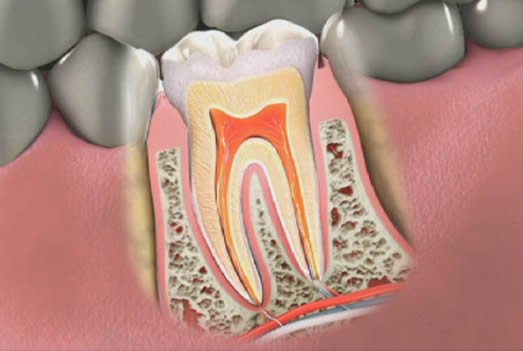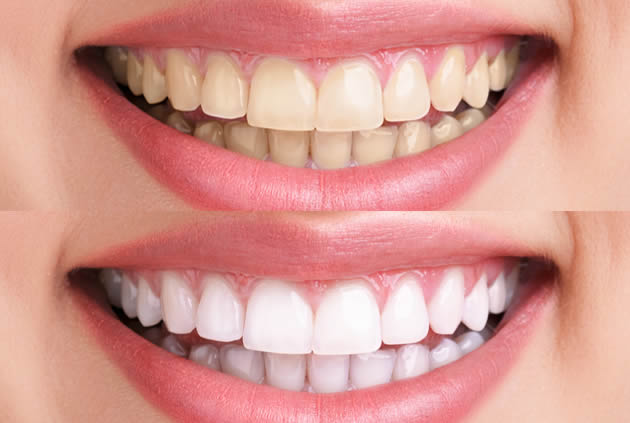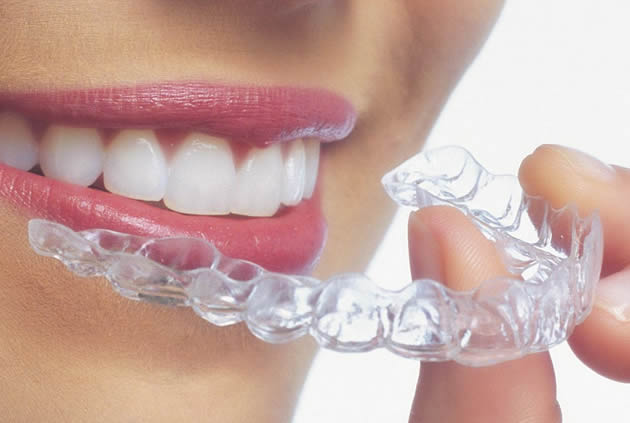
Most of the time, the idea of dentures brings to mind elderly people who are missing a mouthful of teeth. The truth is that dentures are not just for old folks, but for people of all ages who have lost teeth for some reason. Gum disease, tooth decay, and trauma from an accident are all common reasons for tooth loss. There is no need to suffer through life with gaps in your smile, when you can opt for dentures to restore both appearance and function.
The main reasons that many people consider getting dentures include:
- Eating – your teeth help you to chew and eat food. Dentures serve the same purpose, allowing you to eat a normal diet without having to stick only to soft foods or liquids.
- Speaking – when the gaps in your smile have been filled, your ability to speak more clearly and easily is improved.
- Smiling – replacing missing teeth gives you back your self-confidence to smile and laugh again. You will be proud of your new smile and be willing to display it more often. Also, your cheeks will have a fuller look and your appearance may look younger.
When you get dentures, expect that it may take some time to get used to them. They may feel strange at first, and you should be patient while you learn to talk and eat with them. Time will help you adjust to the dentures, but if discomfort lingers you should visit your dentist to make sure the fit is correct and no adjustments are necessary.
Our dental office is located in Baltimore
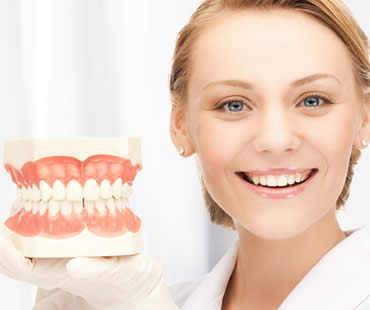
Getting back your ability to smile and eat with a complete set of teeth is one of the great benefits of dentures. To prevent infections, sores, or further tooth damage, it is important to maintain dentures properly. Here are some ways that dentists advise to keep your dentures in great condition.
Cleaning
Rinse your dentures well after meals to remove food particles and avoid stains. Brush them daily with a soft toothbrush to remove plaque and deposits. Use a mild soap or product that your dentist recommends, but avoid harsh toothpaste or strong cleaners.
Soaking
Soak your dentures in water or cleaning solution when you are not wearing them, especially overnight. This helps keeps them from drying out or becoming misshapen. Do not use hot water.
Rinsing
If you use a cleaning solution, rinse your dentures well before putting them back in your mouth. Avoid swallowing denture cleaning solution because it can cause stomach upset.
Handling
Handle your dentures very carefully so that you don’t drop them or bend them. Clean them over a basin filled with water, so that if they fall they shouldn’t be damaged.
Visiting your dentist
Maintain regular checkups with your dentist to get both your mouth and your dentures examined. Most dentists recommend visits every six month for ideal results. See your dentist sooner if your dentures are not fitting well, are causing irritation, or have become loose.
We look forward to seeing you in our Baltimore dental office
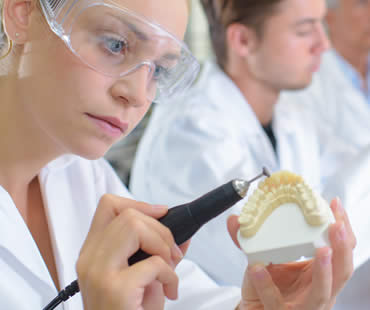
Dentures have been around a long time as a way to restore smiles plagued by missing teeth. They provide a solution for people who want to smile, talk, and eat as normally as possible. Unfortunately, removable dentures aren’t without issues. They can become loose or shift, making it uncomfortable to eat and talk. Messy denture adhesives are bothersome and ineffective for some patients. Therefore, advancements in dental technology have developed the option of permanent dentures.
What are permanent dentures?
Permanent, or fixed, dentures are suitable for patients missing one, two, or more teeth. The appliance is made up of a row of crowns or artificial teeth, which are connected together and the framework is supported by dental implants. The implants act like natural tooth roots, and the permanent dentures create a bite similar to natural teeth.
What are the benefits?
Fixed dentures definitely offers some advantages to removable ones. The need for messy adhesives is eliminated, and you don’t have to worry about loose or ill-fitting dentures affecting you. The force of your bite is also improved, so you can eat all kinds of foods without concern. Because a permanent upper denture doesn’t cover the roof of your mouth, your ability to taste and enjoy food is not sacrificed. This kind of denture stays in place for normal oral hygiene, so there are no special cleaning or soaking requirements. If properly maintained, permanent dentures can last for many years or even a lifetime.
Are there any disadvantages?
Permanent dentures are susceptible to oral problems like infection or inflammation because they are not removable. Also, it is possible that the crowns may require replacement in 10 to 15 years.
If you live in the Baltimore area contact us today

After suffering tooth loss for any reason, it’s important to restore your mouth’s function and appearance with restoration options through your dentist. In the past, many patients have gotten dentures for this purpose. Dental implants provide a newer and very popular option. If you already have dentures but aren’t completely satisfied with them, is it possible to change to dental implants instead?
The answer is yes! Of course, you need to consult your dentist to make sure that you are a good candidate for implants. There are a number of reasons that denture wearers might decide that implants are a better solution to their tooth replacement needs. Some patients find dentures to be uncomfortable because they don’t stay in place securely or they irritate the gums. Some find a more permanent remedy to be more appealing than dentures, and implants do provide a long-lasting solution to tooth loss. If patients with dentures don’t like them and aren’t wearing them consistently, they aren’t achieving the goal of restoration.
There are some additional complications that can occur with dentures, making implants more appealing. Trouble speaking and eating is a hazard if the dentures slip, as well as jawbone loss and increased wrinkles. Some patients even alter their diets due to problems eating certain foods. The increased dental hygiene regimen also bothers some patients who are unwilling to do the extra tasks required.
If you dislike your dentures, consider making the switch to dental implants. It might restore your self-confidence as well as your mouth’s function and appearance.
If you live in the Baltimore area contact us today

No matter how much you want to preserve your real teeth, it’s not uncommon for people to lose teeth. It may occur with age, decay, gum disease, or injury. If this happens to you, there’s no reason to go through life missing teeth in your smile. It’s better to quickly see your dentist for replacement teeth, so that you avoid shifting of your remaining teeth, speech problems, or saggy facial muscles. One solution that your dentist will likely offer to restore your smile is dentures. Here are some tips to help you select the right dentures for you.
Dentist
An important step in the process of getting dentures is making sure you have a qualified and experienced dentist treating you. Most dentists provide dentures as part of their services, or you may choose to go to a prosthodontist. This type of specialist focuses on restorative dentistry. No matter who you choose, make sure that you are confident you will get dentures that meet your specific goals and needs.
Type of dentures
There are several types of dentures available, each with their own attributes. These are the main kinds:
- Full dentures – an acrylic appliance that replaces all of the teeth in your upper jaw. These are functional and replicate your real teeth, and are usually comfortable when fitted correctly.
- Partial dentures – these replace one or two missing teeth using a dental arch. Partial dentures are made of acrylic, metal, plastic, or a combination of these materials. These are attached with a clip that holds them in place in your mouth.
- Permanent dentures – these dentures are permanently attached and require almost no maintenance. They are the costliest of the types of dentures.
Color
Dentures are available in various shades of white so that you can select the color that is most natural for you. Be careful about choosing the brightest white color, which may look unnatural compared to the color of your real teeth. Your dentist will help you find a neutral color that looks best with your smile and complexion.
If you need a dentist in Baltimore contact us today
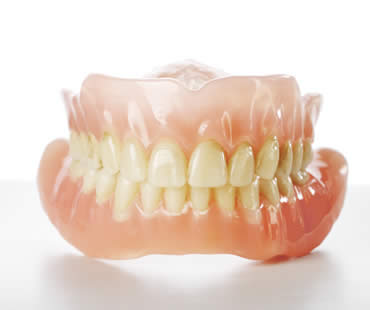
Once you’ve received dentures to restore missing teeth, it will take some time to get accustomed to them. There’s no reason to be alarmed or frightened about wearing dentures, because most patients go through the same adjustment period. If you’re aware of the potential issues and how to react to them, the process will be easier for you. Here are some rules to follow as you begin wearing dentures.
Don’t try to fix them yourself.
Even though dentures are customized just for you, that doesn’t mean they always fit perfectly right away. There might be some molding defects or other minor flaws that cause the dentures not to fit exactly right or rub sores on your gums. If this happens, don’t try to correct the problem yourself. Take your dentures back to your dentist to explain what’s bothering you, and give your dentist a chance to properly and safely adjust them without damaging the dentures.
Watch your diet.
Similar to getting braces at first, you’ll want to stick to eating soft foods for the first few days of denture wear. Avoid foods that are sticky or hard to chew. Focus on chewing with your back teeth instead of the front part of your dentures, and cut your food into small bites.
Soak your dentures.
Soaking your dentures in a solution recommended by your dentist can help keep them hydrated. This will avoid dryness, which causes friction between your dentures and gums and can lead to mouth sores.
You’re going to unintentionally bite yourself.
It’s part of wearing dentures at first; you’ll probably bite the insides of your cheeks. It’s a natural part of adjusting to the appliance in your mouth, and it will subside as you get used to wearing them. Gargling with a fluoride rinse or other mouthwash provided by your dentist may provide relief.
If you need a dentist in Baltimore contact us today












